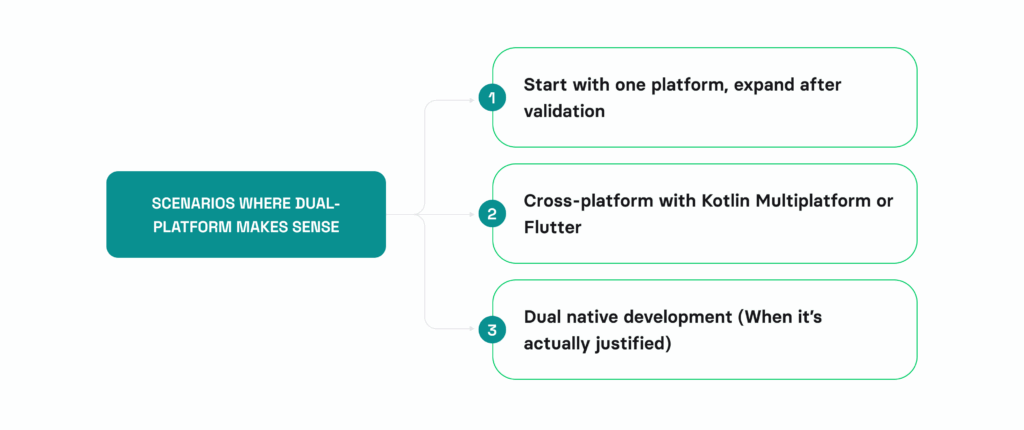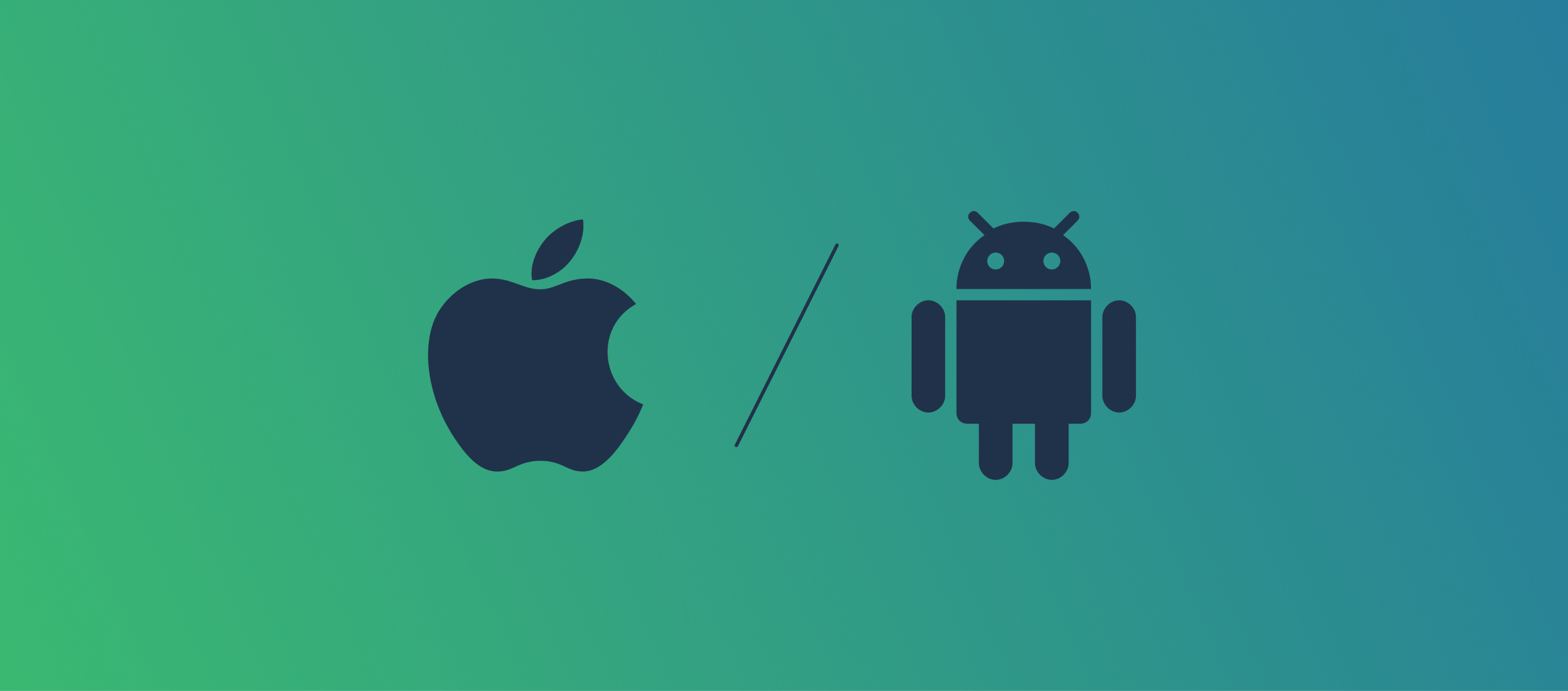Choosing between iOS and Android as your first platform isn’t just a technical preference — it’s a strategic move that can either accelerate or stall your product’s growth.
For startups building their first mobile app, the platform you choose impacts time-to-market, development cost, audience reach, and monetization strategy. Pick wrong, and you may burn time fixing early mistakes instead of scaling what works.

At Volpis, we’ve guided startups across logistics, fleet, and SaaS through this exact decision. Some launched Android-first to support rugged field devices. Others led with iOS to reach premium B2B users faster. There’s no one-size-fits-all, but there is a right choice for your specific product.
This article cuts through the noise. No opinions, no guesses — just the essential criteria that matter in 2026.
What is different about Android and iOS development in 2026?

The iOS vs Android platform debate isn’t new, but the dynamics in 2026 are. Tools have matured, user behavior has shifted, and platform expectations are higher than ever.
- Cross-platform frameworks like Kotlin Multiplatform and Flutter are more stable, but when performance, UX consistency, or deep platform integration matters, startups still benefit from native mobile app development, tailored to the product’s technical and business needs.
- iOS users consistently spend more. If your monetization model depends on subscriptions or in-app purchases, you’ll likely earn more per user on iOS. In 2024, iOS accounted for nearly double the consumer app revenue compared to Android (Statista, Mobile App Revenues by OS).
- Android dominates global device share, especially in emerging markets, but with wider fragmentation and more complex QA.
Frameworks have improved, but the tradeoffs are still real, and your platform decision in 2026 should map to product context, not just technology trends.
iOS or Android app development: 3 real criteria to choose the right platform for your app

Forget generic checklists. The platform you launch on should be driven by four core factors — all grounded in business, not opinion.
1) Target market
Where your users are matters more than how the platforms compare technically.
- iOS first makes sense for North America, Western Europe, and premium SaaS markets.
- Android first is typically the better call for LATAM, Asia, Africa, or any product targeting field teams with rugged or lower-cost devices.
- Internal tools? Prioritize the platform your team or partners already use.
2) Budget and QA complexity
Device diversity impacts development speed, not just cost.
- iOS has fewer device types and screen sizes, which simplifies testing and shortens QA cycles.
- Android development requires more time for compatibility testing, especially across tablets, phones, and manufacturers.
The actual dev cost difference between iOS and Android is often under 15%. But extended QA for Android platform can slow releases, especially for early-stage teams under pressure.
3) Monetization strategy
How you plan to make money should shape your platform decision.
- iOS users generate more revenue per user, especially via subscriptions and in-app purchases.
- Android boasts a broader reach, better for ad-based or scale-first models where conversion rates are lower.
- B2B products? Consider your clients’ internal device ecosystems — and what’s easier to support.
If your monetization hinges on retention and UX, Swift programming language developers can help deliver polish faster on iOS.
Startup scenarios (and what works)
This isn’t about technical preference. It’s about aligning your first platform with your target market, business model, and growth priorities. Here’s how we approach it with startups:
| Scenario | Start With | Why |
| B2C startup targeting US, UK, or EU | iOS | iOS dominates high-income markets where users pay for apps, subscriptions, and in-app services. Easier to acquire early, high-value users. |
| Product aimed at emerging markets or a global scale | Android | Android leads in LATAM, Africa, Southeast Asia, and parts of Eastern Europe. Better if you’re optimizing for user volume or scale-first strategies. |
| Internal business tool or B2B MVP with a known client base | iOS | Most corporate environments rely on iOS devices. Easier to onboard teams and support known client ecosystems. |
| Field workforce, logistics, or hardware-integrated use cases | Android | More compatible with rugged tablets, barcode scanners, vehicle-mounted systems. Android’s flexibility makes it standard in operational environments. |
| Long-term plan to go cross-platform, need quick market entry | iOS | Strong starting point if monetization is key. Allows fast validation with high-value users before scaling to Android when the model is proven. |
CTO-level takeaway: Start where your users already are — and where you can prove value fastest. Platform choice isn’t about code. It’s about de-risking your go-to-market. Make the platform serve the strategy, not the other way around.
Volpis POV: platform follows product, not the other way around

Founders often ask: “Should we build for iOS or Android first?”
Our answer: It depends on what you’re really building.
Platform choice is important, but it’s a downstream decision. If your product vision isn’t clear, if you’re still guessing what your users truly need, the platform doesn’t matter yet. You’ll waste time optimizing the wrong thing.
What actually matters early on:
- Who are your first users?
- What problem are you solving — and how urgently do they feel it?
- What’s the simplest version of your solution that proves value?
Until that’s nailed down, platform debates are a distraction. That’s why many of our projects start with Business Analysis, not development. We help startups cut through assumptions, define their MVP clearly, and only then pick the platform that best supports their real-world launch.
This approach prevents rework, misalignment, and scope bloat. And it ensures your tech stack supports the product, not the other way around.
Thinking of building both? Here is what works

It’s tempting to build both iOS and Android apps from day one. Founders want coverage, VCs want traction, and users expect availability. But unless you have clear signals and enough budget, building for both too early usually spreads teams thin and slows down validation.
That said, there are scenarios where dual-platform makes sense. Here’s how to approach it strategically.
Option 1: Development process starts with one platform, expands after validation (recommended for 80% of MVPs)

If you’re pre-revenue or still testing product-market fit, start focused. Launching on one platform allows you to:
- Ship faster
- Test your core value prop
- Reduce overhead and technical risk
- Allocate the budget where it actually moves the needle
Once you’ve validated user demand and workflow quality, you can confidently invest in the second platform, based on real feedback, not assumptions.
At Volpis, we’ve seen iOS-first MVPs gain traction and fund Android builds within 3–6 months, all without overengineering v1.
Option 2: Cross-platform with Kotlin Multiplatform or Flutter

Best for simple UIs and shared logic
If your product has a light UI and you want to consolidate business logic across iOS and Android, cross-platform frameworks can offer speed and efficiency.
- Kotlin Multiplatform gives you native UIs with shared logic
- Flutter gives you one codebase for everything, useful for less platform-specific apps
Use this if your business logic is clear, your features are moderate, and your UX expectations aren’t platform-heavy.
Avoid this path if you’re building real-time apps, hardware integrations or AR.
Option 3: Dual native development (when it’s actually justified)

Build for both platforms only if the context demands it
There are only a few cases where building iOS and Android simultaneously makes sense:
- You already have a web product with an active, validated user base
- Your users have made it clear they need mobile access now, and they’re split across platforms
- You have enterprise contracts, hardware integrations, or pre-committed demand requiring dual-platform availability
- Your business model demands maximum reach from day one (e.g., regulated industries, B2B2C with strict SLAs)
This isn’t an MVP — this is phase two of a validated product.
Dual-platform builds require coordinated native teams, larger budgets, and clearly defined success metrics. If that’s your situation, we can help — but only after confirming that dual-platform isn’t premature.
Focus beats coverage
Choosing the right platform isn’t a tech decision. It’s a business decision, grounded in your users, market, and product stage.
iOS or Android app development first? The answer depends on where your early traction will come from, how your users behave, and what you actually need to validate. Most successful startups start focused, learn fast, and scale intentionally, not symmetrically.
At Volpis, we help you do just that. Whether you’re validating an MVP or extending a mature product to mobile, we align your platform strategy with your business goals, not trends or assumptions.
How our developers create custom iOS and Android apps with over a million downloads
The Volpis team has been leveraging the power of both iOS and Android to build robust applications. One recent example is the Holy Quran app.

The Holy Quran is a popular non-profit mobile app for Android and iOS. The app’s main objective is to provide accurate knowledge about Islam and serve as a platform for studying the Quran. A few years ago, the app needed significant updates.
Our team focused on performance optimization, UI/UX improvements, and backend maintenance.
The app has become a trusted resource for the Muslim community and those interested in Islam. Today, the app has a 4.8-star rating, over 11,000 reviews and has surpassed 1 million downloads.
How Volpis can bring your app vision to life
Consistently recognized as one of the top custom software development companies on Clutch, our team at Volpis has rich experience in mobile app development for iOS and Android.
Our commitment to excellence is reflected in the glowing reviews from our customers, who consistently praise our dedication to delivering exceptional results.

Read more reviews from our valuable customers here
If you’re looking to build a high-quality mobile applications, we invite you to explore our Kotlin development services and Swift expertise. Whether you’re starting from scratch or scaling an existing app, our dedicated developers can help bring your vision to life with clean architecture, performance-focused code, and user-centric design.
We invite you to explore our portfolio for a detailed look at the innovative software systems we have developed for our clients.
We’d love to answer any questions you may have about iOS and Android app development. You can reach out to us via info@volpis.com with any questions or to explore how we can be part of your journey.
FAQ
What if I start with iOS, but my users shift toward Android later?
That’s fine — the goal of starting with one platform is to validate fast. If user data shows momentum on Android, you can port with a purpose. Just ensure your backend and design system are flexible enough to scale without rewriting major components. The Android platform offers significant reach in the global market share, making it a smart pivot once early traction is confirmed. Transitioning from iOS to Android allows you to test monetization through ads or free apps, which often perform well in emerging regions.
How early should I decide on cross-platform vs native?
Ideally, before development starts. Switching mid-build often leads to rework, performance trade-offs, or delays. Let your MVP goals, feature complexity, and timeline drive the tech, not the other way around. Choosing between native apps and cross-platform tools impacts your scalability and long-term support. If your app idea heavily depends on platform-specific hardware, native is often the better route.






